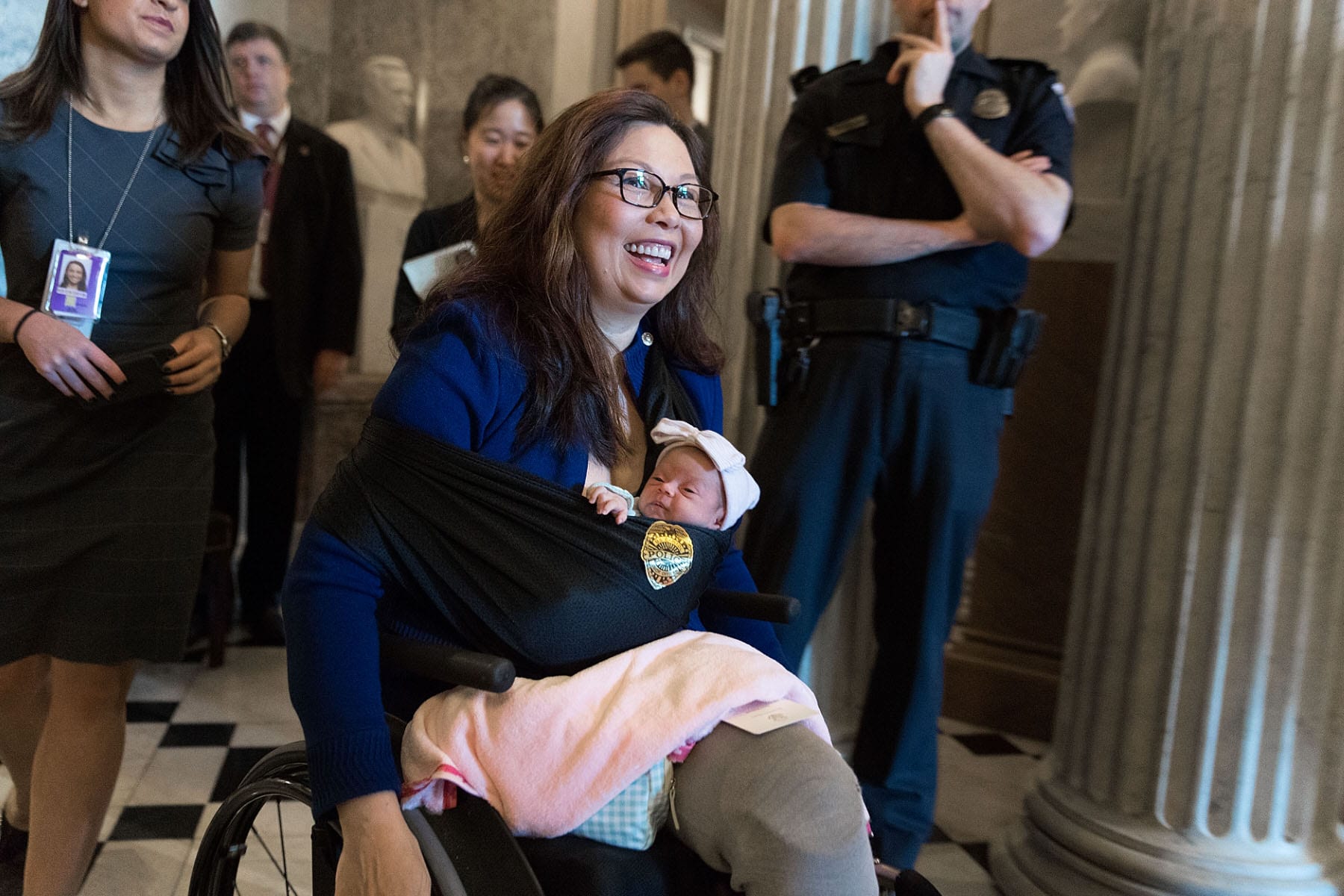“There is no greater agony than bearing an untold story.”
Rep. Ayanna Pressley, a Massachusetts Democrat, said she saw this over and over as constituents came to her with stories of pregnancy loss and setbacks in adoption, surrogacy and other ways they wanted to build their families. They were hurting, she said, but did not feel comfortable taking time off to grieve.
While pregnancy is typically widely celebrated, those struggling to grow their families typically do so privately out of any combination of grief, stigma or fear of retaliation should their employer find out they are trying to conceive. Whether grappling with a miscarriage, an unsuccessful IVF cycle, or an adoption or surrogacy agreement falling apart, these setbacks are painful for an individual and their partner, both, especially as they are faced with quietly carrying this emotional load and continuing on with their lives immediately.
This, Pressley said, is why she and Sen. Tammy Duckworth are introducing the Support Through Loss Act, which would establish three days of paid leave benefits for working Americans experiencing painful challenges while seeking to grow their families. Bills were introduced in both chambers of Congress on Tuesday.
“Our policies have to keep pace with the way we understand family models and the kinds of traumas they experience,” Pressley said. Pregnancy loss in particular, she noted, is discussed too rarely. “Because of cultural trauma and stigma and isolation, people don’t realize how much of an issue it is,” she said.
For Duckworth, an Illinois Democrat, this grief and loneliness is personal. The senator told The 19th she went through “many, many, many, many failed IVF cycles,” in addition to one cycle that resulted in a pregnancy that ended in a miscarriage. Each failed cycle, Duckworth says, “was a personal loss and devastation I had to suffer through on my own. I couldn’t share with anyone, I couldn’t really talk about it.” When she had her miscarriage, she then needed to “gather myself and go back to work that afternoon.”
Pressley said that recognizing the prevalence of challenges in family building is just the first step. To do so meaningfully also means expanding the universal paid leave conversation to include guaranteed time off for pregnancy loss, unsuccessful fertility treatments, or failed adoption or surrogacy matches, and thinking about leave in a “more inclusive” way. She points to the way that many companies now offer not just paid leave for the birthing parent, but for partners regardless of gender or the way in which a new child becomes part of a family.
Dr. Wael Salem, a reproductive endocrinologist and fertility specialist at CCRM San Francisco, shared with The 19th that he regularly hears patients talk about the mental exhaustion they deal with as a result of going through infertility treatment of all kinds. The situation can be even more extreme for those in need of a third-party donor, gestational carrier, or pursuing adoption.
“It is a process which is inherently loaded with optimism when things are going well and the parallel opportunity for deep disappointment when they take a turn for the worse,” he said.
But he adds that “many patients” have told him that they feel “a significant sense of relief” when they find they are able to share about their situation with their boss or coworkers. This is something that Duckworth hopes the bill can amend.
“Families suffering through loss don’t have to go through it by themselves,” Duckworth said.
In addition to expanding leave, both versions of the bill also call for $45 million to be allocated for coordinated research to better understand just how common pregnancy loss is and how to best support those experiencing it. It also requires the federal government to direct the Centers for Disease Control and Prevention and the National Institutes of Health to distribute information on pregnancy loss, miscarriage prevalence, treatment options and ways to support people experiencing these things — including making sure they are eligible for paid leave.
You have to disclose a lot of information — that you want to start a family and that you aren’t able to.
Erin Grau, the co-founder of Charter, on why employees might not seek bereavement leave after a setback in family building
Pressley adds that the passage of this bill is also a critical workers’ rights issue, especially given what’s already known about the challenges pregnant people face in the workforce. Guaranteeing their protection — and ability to access leave and mental health resources — while trying to get pregnant without fear of retaliation is key, Pressley said, to ensuring that the United States’ post-COVID recovery is “not a recover to our pre-COVID status quo normal that was already insufficient.”
Movement on acknowledging these challenges has been uneven in the private sector.
“I really wish companies would acknowledge the full spectrum of challenges around becoming a parent and being a parent today,” Erin Grau, the co-founder and COO of Charter, a media company focused on the future of work. “I wish companies were more compassionate and understanding that grief and loss are an experience and not an event. You have no idea who is trying to become a parent, who was once a parent, who is trying to expand their family, who is exploring the possibility of parenthood.”
Coming out of the pandemic, Duckworth said that it is “time to recognize the contributions of women in our economy.” A bill like this is one step towards that.
“We wanted to ensure that we included the importance of not just those who are struggling to become pregnant in our bill, but those who are dealing with failed adoption or surrogacy, since those are just as devastating as a miscarriage or failed IVF cycle,” she said.
Andrea Braverman, a psychologist and clinical professor in the department of obstetrics and gynecology at Jefferson University and an expert on mental health and infertility, said that desire for privacy stemmed in part from expectations in fertility. “We’re primed from childhood that fertility is a given,” Braverman said. She noted that pregnancy loss or infertility is often one of the first major challenges a person faces in their adult life, one only made harder because it is “multi-level — it’s a private grief. We usually don’t run around telling people, ‘Hey I’m trying to conceive and I’m not able to!’ It’s a loss of agency.”
Furthermore, Braverman said, few Americans are comfortable talking about loss. Braverman recalled one pregnancy loss support group she ran where one person expressed her frustration over no one asking her how she was doing and about her experience with loss. After she spoke, “This other woman looks at her with horror on her face. ‘I don’t want anyone to ask me how I am. I want everyone to leave me alone.’”
Duckworth went through a similar situation herself. Though she didn’t cry when she got the call from her doctor telling her she had miscarried and didn’t cry when she then had to call and relay the news to her husband, her chief of staff immediately burst into tears when she then called her, which made Duckworth finally cry too. “She was recognizing the loss and supporting me through that.”
Meanwhile, Duckworth says her own doctor was “trying to buck me up, saying, ‘Women have miscarriages all the time! We’re going to try again! This is an everyday thing!’ He was trying to get me to move on.”
Through all of it, Duckworth said she mainly wondered if her miscarriage was somehow her fault, if she had wrongly self-administered one of medications needed to sustain a pregnancy following in vitro fertilization.
-
More from The 19th
- How Houston’s first pregnant city council member is using her power to enact change
- ‘A bigger hit than the cancer itself’: How some states are working to help cancer patients with infertility
- Pregnant workers have fought for years for accommodations at work. They may finally get them.
Then, between tears and calls and scheduling next doctor’s appointments, Duckworth had to go back to work. “I didn’t want to publicly grieve. If I had three days to privately go through the process, I would have been better off.”
It’s why Duckworth and Pressley’s bill focuses on not just paid time off, but also education and mental health resources, so that regardless of how a person is experiencing loss, they can access what they best need to cope.
“As we are charting a path forward, this conversation about human infrastructure needs to be about prioritizing the health of the nation, which begins with the health of our families,” Pressley said. “That is our greatest wealth as a nation. Navigating pregnancy is so filled with challenges for individuals and families and workers, and that was before COVID. Now, all those issues are much more compounded.”
Grau said that the first step towards building towards a solution is acknowledging that workplaces need to allow for flexibility, something that is especially critical to those going through fertility treatments, adoption and miscarriage. Grau would also like to see pregnancy loss included in bereavement leave.
Salem concurred. “It is essential that employers allow for some flexibility in a person’s schedule so that they can attend the appointments,” he said “This alleviates a great deal of stress when that individual is navigating a difficult process already.”
Further complicating these conversations, though, Grau said, is the fact that bereavement leave in general requires disclosure, a necessary component for accessing leave given for work and health insurance are broadly structured in this country. She added that the biggest fear many employees face in this process is fear of retaliation for becoming pregnant or being perceived as choosing family over career.
To access bereavement leave for pregnancy loss, she said, “you have to disclose a lot of information — that you want to start a family and that you aren’t able to. That’s a lot to disclose in one conversation.”
That’s why Grau stressed that thinking about these issues holistically is not simply about the leave; a holistic approach to this issue is which inherent in Duckworth and Pressley’s bill. For real change to happen, employers must create a culture of support for taking leave and a culture of support for caregiving and the ability to grow both a career and a family.
Grau pointed to the differences seen already in how various high-profile companies are discussing the return to work post-pandemic: Salesforce, for example, is talking about “flexibility” and has mentioned that in the context of caregiving specifically in their reopening plans. In contrast, Spotify mentions flexibility on their return to work plan listed on their website, but doesn’t mention caregiving at all.
“That’s just one signal,” Grau said. “I am extremely worried. There were a lot of benefits in terms of support and subsidies during the pandemic, and we need to keep talking about those things. They aren’t just things parents only needed during the pandemic. Parents needed these things before and they will still need it after.”







